 |
|
| |
|
Fourth
meeting of the Ad hoc Open-ended Working Group on
Access and Benefit-sharing of the Convention on Biological
Diversity |
|
30 January -
3 February 2006 | Granada, Spain
|
|
|
|
|
|
Highlights
for Tuesday, 31 January 2006
|
|
|
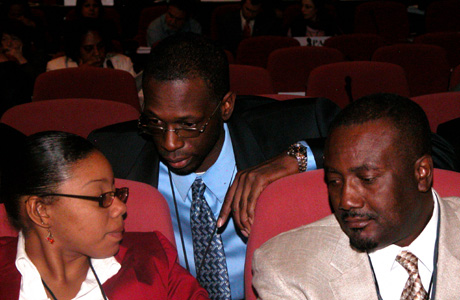
|
|
Delegates
to the fourth meeting of the Ad hoc Open-ended
Working Group (WG) on Access and Benefit-sharing
(ABS) of the Convention on Biological Diversity
(CBD) met in a Committee of the Whole, and
addressed the elements and objectives of an
international regime on ABS, a certificate of
origin/source/legal provenance, and measures to
ensure compliance with prior informed consent (PIC)
and mutually agreed terms (MAT). A Friends of
the Chair group met in the afternoon to discuss
participation of indigenous and local
communities in the ABS negotiations.
Above photo
L-R: Caribbean delegates, Ruleta Camacho (Antigua and
Barbuda), Randolph Edmead (Saint Kitts
and Nevis) and Deon Alexander Stewart
(Bahamas) in consultation.
|
|
|
|
|
|
|
COMMITTEE
OF THE WHOLE
|
|
|
|
|
|
|
INTERNATIONAL REGIME ON ABS:
|
|
|
|
|
|
 |
|
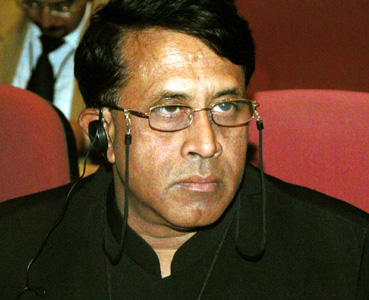 |
|
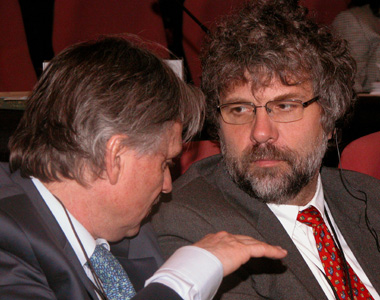 |
|
|
|
|
|
|
Venezuela, on behalf of GRULAC, prioritized: capacity
building; protection of traditional knowledge; financial mechanisms to guarantee the regime’s
implementation; and a certificate of legal provenance generated by countries of origin.
Above photo L-R: César Molina
and Jesús Ramos (Venezuela)
|
|
India, on
behalf of the LIKE-MINDED MEGADIVERSE COUNTRIES (LMMC), said the regime should implement the
CBD objectives and include benefit-sharing, compliance measures, a certificate of legal
provenance, traditional knowledge protection, effective implementation and financial
mechanisms.
Above photo: Desh Deepak Verma (India)
|
|
SWITZERLAND proposed
regrouping the list of elements into clusters on: access;
benefit-sharing;
traditional knowledge; compliance, including prior informed consent (PIC), mutually agreed terms
(MAT) and certificates of legal provenance; and capacity
building.
Above photo L-R: Robert Lamb and François
Pythoud (Switzerland)
|
|
|
|
|
|
|
|
|
|
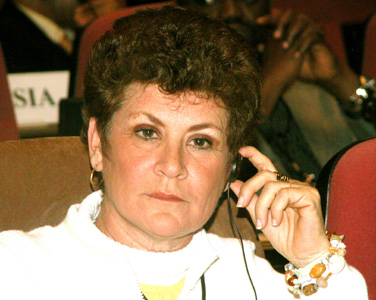
|
|

|
|
|
|
|
COSTA RICA said access to genetic
resources falls under national sovereignty and does not require an international instrument other than
for providing legal certainty.
Above photo: Martha Jiménez Fernández (Costa
Rica)
|
|
AUSTRALIA said access is a fundamental building block of the regime.
Above photo L-R: Anne Marie Watt, Geoff
Burton, David Cunningham and Susan Jones
(Australia)
|
|
|
|
|
|
|
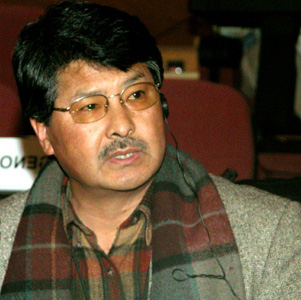 |
|
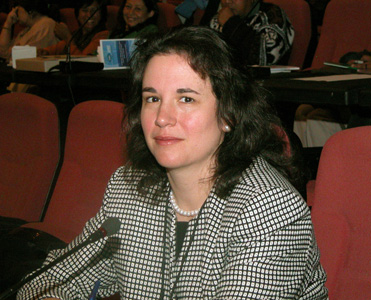 |
|
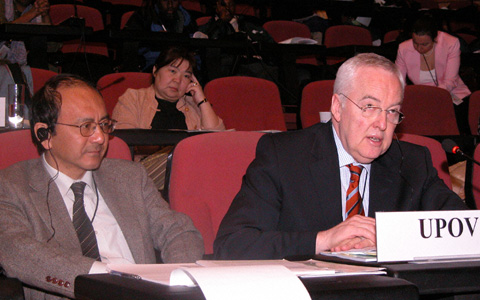 |
|
|
|
|
|
|
The UN PERMANENT FORUM ON INDIGENOUS ISSUES stressed that any instrument must conform to existing and emerging international law relating to indigenous rights.
Above photo: Pashuram Tamang (UNPFII) |
|
The UN CONFERENCE ON TRADE AND DEVELOPMENT (UNCTAD) drew attention to its study of options for implementing disclosure of origin requirements in intellectual property right
(IPRs) applications.
Above
photo: Sophia Twarog (UNCTAD)
|
|
The INTERNATIONAL UNION FOR THE PROTECTION OF NEW VARIETIES OF PLANTS (UPOV) said the principles of plant variety protection and
breeders' rights should be recognized in the regime.
Above photo L-R: Makoto Tabata and Rolf
Jördens (UPOV) |
|
|
|
|
|
|
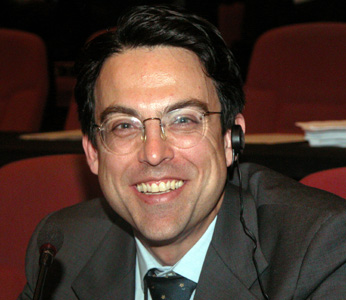 |
|
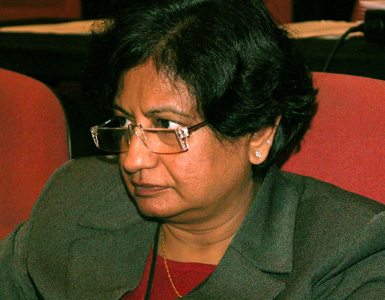 |
|
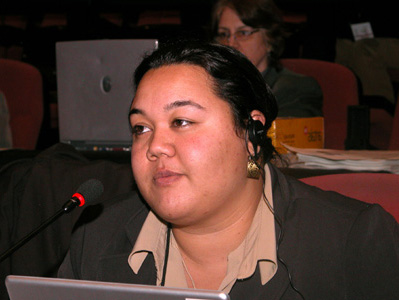 |
|
|
|
|
|
|
WIPO
reported on the preparation a technical paper
contributing to international discussions on ABS and
IPRs and clarifying legal questions for submission to
COP-8.
Above photo: Shakeel Bhatti (WIPO) |
|
The
WORLD TRADE ORGANIZATION (WTO) reported on the
activities of the Council on Trade-related Aspects of
Intellectual Property Rights (TRIPS) and the
consultative process on outstanding implementation
issues, including on the TRIPS-CBD relationship.
Above photo: Jayashree Watal (WTO) |
|
The
IIFB highlighted human rights instruments, and noted
that the recognition and protection of indigenous
rights is not a single element but a crosscutting
issue.
Above photo: Le'a Malia Kanehe (IIFB) |
|
|
|
|
|
|
|
CERTIFICATE
OF ORIGIN/SOURCE/LEGAL PROVENANCE:
|
|
|
|
|
|
|
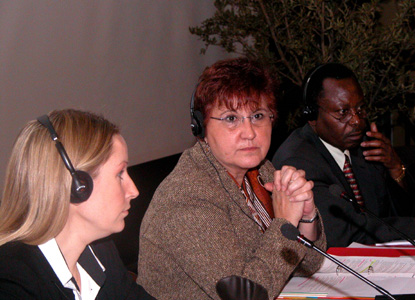
|
|

|
|
|
|
|
Chair
Margarita Clemente (
Spain
) opened the discussion on other approaches, including
the design of an international certificate of
origin/source/legal provenance.
Above photo L-R: The COW dais with Valerie Normand (CBD),
WG ABS-4 Chair Clemente and Dan Ogolla (CBD) |
|
The
EU said an international certificate could be a key
component of an international ABS regime, while
cautioning against a “one-size-fits-all”
certificate and high transaction costs.
Above
photo: Elfriede Anna More (Austria on behalf of
the EU)
|
|
|
|
|
|
|
|
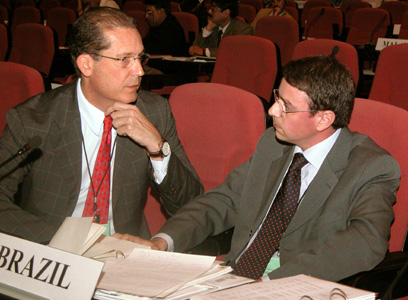 |
|
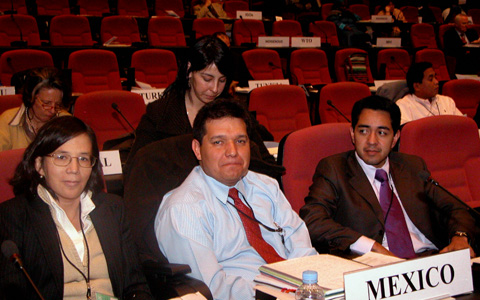 |
|
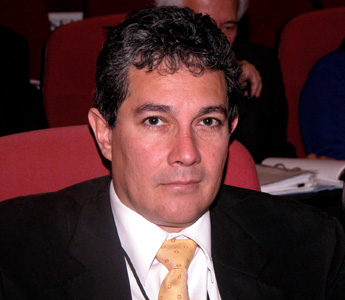 |
|
|
|
|
|
|
BRAZIL
supported a certificate of legal provenance of genetic
resources, derivatives and traditional knowledge as
one of the central elements of an international
benefit-sharing regime.
Above photo: Hadil Fontes Da Rocha Vianna and Henrique
Choer (Brazil) |
|
MEXICO
,
supported by many, said a certificate should provide
an international instrument to trace genetic resources
across the entire reach of CBD obligations, and have
clear triggers to activate disclosure requirements.
Above photo L-R: Margarita Palafox, Hesiquio
Benitez-Diaz and Mariana Bellot Rojas and
Jesus Vega Herrera (Mexico) |
|
EL
SALVADOR
said that certification of legal provenance is a key
element to certifying legality of access, and it
should be complemented by a national regime.
Above photo: Jorge Ernesto Quezada Diaz (El
Salvador) |
|
|
|
|
 |
|
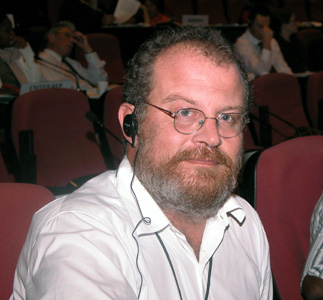 |
|
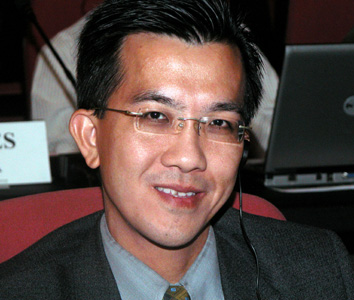 |
|
|
|
|
|
|
CHINA
proposed using certificates of origin and, when
varieties are improved ex situ, certificates of
source including breeding categories and genetic
characteristics.
Above photo: Dayuan Xue (China) |
|
NAMIBIA
supported an international certificate of origin and
the establishment of additional conditions through
material transfer agreements.
Above photo: Pierre du Plessis (Namibia)
|
|
SINGAPORE
said certificates would be useful as long as
they do not bar IPR requests.
Above photo: Nigel Goh (Singapore) |
|
|
|
|
|
|
|
COMPLIANCE
WITH PIC AND MAT:
|
|
|
|
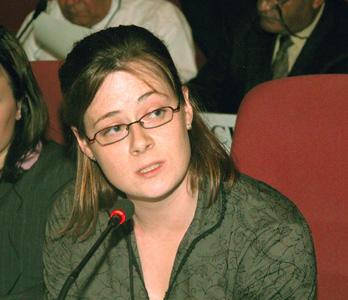 |
|
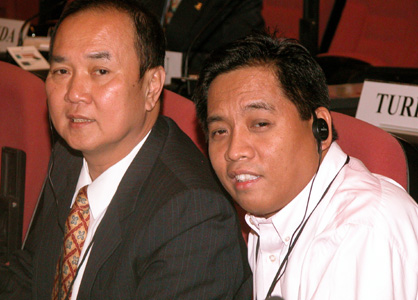 |
|
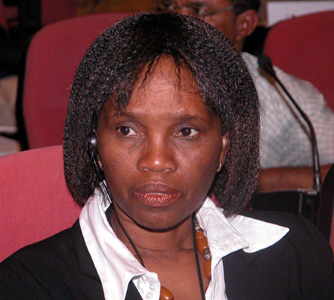 |
|
|
|
|
|
|
CANADA
highlighted the need for: efficient and timely
administrative processes, proper identification of
knowledge holders, respect for decision-making
processes of indigenous communities, and common
understanding of the consequences of granting PIC for
providers and users of traditional knowledge.
Above photo: Sophie Bernier (Canada) |
|
THE PHILIPPINES
requested considering the special situation of shared
resources in ensuring compliance with PIC.
Above photo: Virgilio
Vitug and Elpidio Peria (The Philippines)
|
|
SOUTH AFRICA
underlined the role of national measures to
ensure disclosure of origin and benefit-sharing.
Above photo: Maria Mbengashe (South Africa)
|
|
|
|
|
|
|
|
|
|
|
|
|
|
|
|
|
|
|
|
|
|
|
|
|
|
|
|
|
 up to top
up to top |
|
|
|
|
| |
|
Related Links
|
|
|
|
|
| |
|
| |
|
|
|
|
|
| |
|
 Please
e-mail the
Digital Editor if
you have any questions regarding the content of this
page. Please
e-mail the
Digital Editor if
you have any questions regarding the content of this
page.
| Back to
Linkages home | Visit
IISDnet | Send e-mail to
ENB |
© 2006, IISD. All rights reserved. |
|























